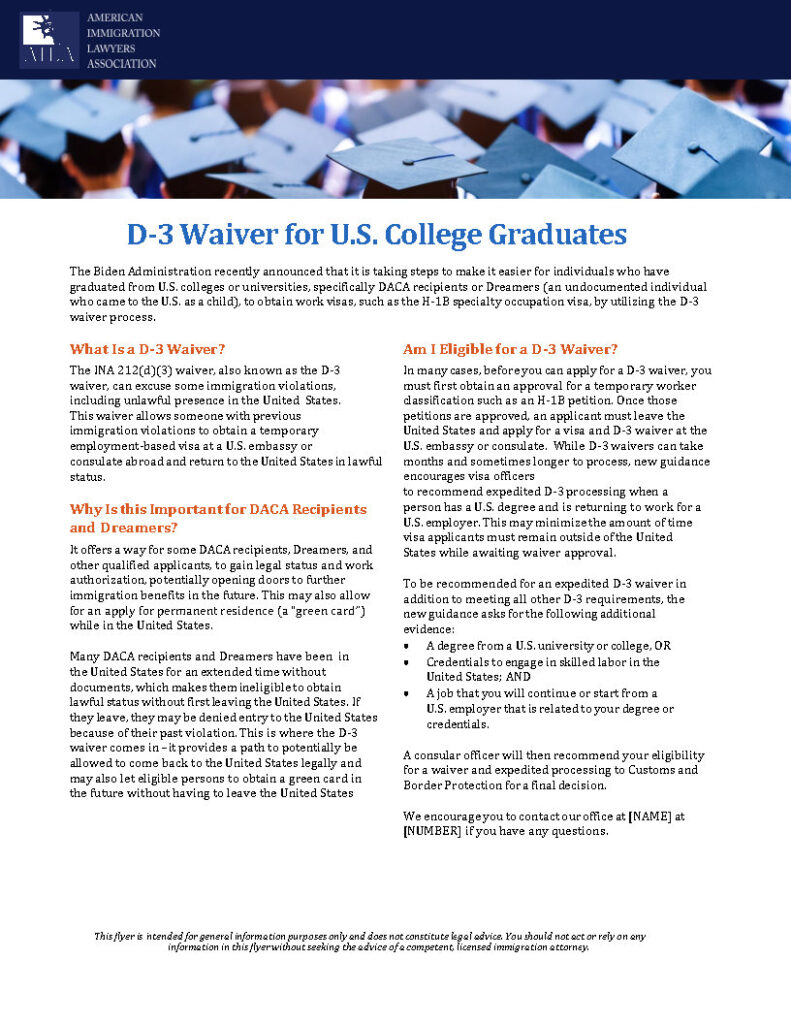On December 18, 2024, the U.S. Citizenship and Immigration Services (USCIS) published a final rule implementing significant updates to the H-1B visa program. The new rule is designed to modernize and improve the efficiency of the H-1B process, enhance benefits and flexibility for petitioners, and bolster integrity measures within the system.
For employers and foreign nationals navigating the H-1B landscape, the following key takeaways from the final rule are crucial to understand:
1. New Form I-129 Required Starting January 17, 2025
Beginning January 17, 2025, any H-1B petition filed must use the new Form I-129, Petition for a Nonimmigrant Worker. This form reflects the changes introduced by the final rule, including the updated eligibility criteria for H-1B specialty occupations.
2. Updated Definition of Specialty Occupation
A significant change in the final rule is the clarification of the “specialty occupation” definition. Under the updated rule, a position will qualify as a specialty occupation only if it requires the practical and theoretical application of specialized knowledge and at least a bachelor’s degree in a directly related specific specialty, or its equivalent field. Notably, USCIS has removed references to business administration or liberal arts degrees as ineligible general degree requirements, emphasizing the importance of the beneficiary’s actual course of study in relation to the position’s duties.
Petitioners seeking to establish that a role qualifies as a specialty occupation because a specific degree is “normally” required will now only need to demonstrate that it is “typical” or “common,” rather than proving that it is the absolute minimum requirement for all cases.
3. Changes to H-1B Cap Exemptions
The final rule revises the criteria for cap exemptions for nonprofit research and governmental research organizations. The new requirement is that research must be a “fundamental activity” of the organization to qualify for an exemption, rather than the prior “primary mission” criterion. Importantly, the rule clarifies that work performed at a qualifying institution can include telework or remote work.
Additionally, the rule specifies that to qualify for an ACWIA fee exemption, a nonprofit must be recognized by the IRS as tax-exempt under sections 501(c)(3), (c)(4), or (c)(6).
4. Refined Definition of U.S. Employer
USCIS has broadened the definition of “U.S. Employer,” no longer requiring that the petitioner maintain a direct employer-employee relationship. This change now includes those with legal presence in the U.S., a U.S. tax ID number, and the ability to service process. The revision also allows owner-beneficiaries to petition on their own behalf, providing more flexibility for self-petitioning.
5. Elimination of Itinerary Requirements and Changes to Third-Party Worksite Requirements
One major shift in the rule is the removal of the itinerary requirement. Previously, petitioners had to submit detailed day-to-day work assignments for the entire validity period of the H-1B petition. Now, petitioners only need to demonstrate that the position will exist at the start date of the petition, without detailing every assignment in advance.
For H-1B workers assigned to third-party worksites, USCIS will now examine the job requirements of the third-party, not the petitioner. The agency will focus on whether the job aligns with the third party’s organizational needs and operations. Importantly, the final rule formalizes the need for contracts, statements of work, and client letters to verify the bona fide nature of the job offer.
6. Expanded Site Visit Authority
USCIS has expanded its authority to conduct site visits for H-1B workers. Inspections may now be conducted at the petitioner’s worksite, remote work locations, and third-party customer sites, including the private residence of workers engaged in remote work. If USCIS is unable to verify any facts—due to non-cooperation from the petitioner or third parties—it may deny or revoke the petition.
7. Deference to Prior Determinations
The new rule codifies USCIS’s existing deference policy, meaning the agency will generally defer to prior determinations for the same parties unless there is a material error, a change in circumstances, or new adverse information that affects eligibility. This policy applies to all nonimmigrant classifications using Form I-129, not just H-1B petitions.
8. Changes to Extension of Status Petitions
Under the updated rule, petitions for extension of status for H-1B, L-1, O-1, and P-1 visa holders will now generally require supporting evidence, unless specifically requested by USCIS. This is a change from the previous regulation that indicated such evidence was not necessary unless explicitly requested.
9. H-1B Cap-Gap Extension Adjustments
The final rule adjusts the timeline for H-1B cap-gap extensions, extending the eligibility until April 1 of the fiscal year or the start date of the approved H-1B petition, whichever is earlier. Previously, these extensions only lasted until September 30, the day before the start of the new fiscal year.
10. Validity Period for Approved Petitions
The new rule clarifies how the validity period is determined in various scenarios, including when the petition is approved before or after the requested start date. If the approved petition’s dates differ from the requested validity period, USCIS may issue a Request for Evidence (RFE) to confirm or adjust the dates based on the Labor Condition Application (LCA).
11. Amended Petitions Clarification
The final rule also provides additional clarity regarding the filing of H-1B amended petitions, essentially codifying the Matter of Simeio Solutions decision. Under the new rule, a petitioner must file an amended petition if there is a material change in the terms and conditions of employment. This includes changes in job location or position duties. However, the rule also incorporates Department of Labor (DOL) guidance on when a new Labor Condition Application (LCA) is not required, such as for peripatetic (traveling) workers or short-term placements.
As always, it is advisable for employers and workers to consult with an experienced immigration attorney to ensure they meet the requirements of the new rule and avoid delays or denials in the application process

